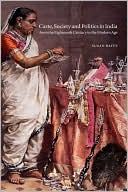

 |

|

The average rating for Caste, Society and Politics in India from the Eighteenth Century to the Modern Age, Vol. 4 based on 2 reviews is 3 stars.
Review # 1 was written on 2019-02-12 00:00:00 Nali Tom Nali TomThis book tracks the concept of caste and its influence on Indian Society and the national discourse from the 18th century onward. It is relevant because caste must be addressed as a significant factor in socioeconomic status, and because the British empire's characterizations of caste helped shape Indian conceptions of caste, and of themselves, in the generations after colonial rule. When the British encountered the concept of caste, they brought upon it their currently all-encompassing paradigm of the naturalness of rank, or a natural evolutionary hierarchy that ordered the world. This paradigm or mindset had three results. First, the British initiated the All-India Census, which introduced the innovation of rigidification of hundreds of ranks and castes, compiled and standardised to resemble Western tables of classification on zoology and botany. Second, the British hunted for collaborators through the lens of caste, immediately designating castes like Brahmins and other agreeable classes, like merchants, as enlightened literates who could be relied upon to collaborate and ease the burdens of colonial administration on the empire. This had the effect of converting caste status into effective socioeconomic status, effectively parceling out the choicest jobs in the colony according to caste. Lastly, the British paradigm of rank drew upon popular racial theories of the day to effortlessly construct a natural 'hierarchy' of states. Here, the British were at the apex of civilization, while societies like the Aryan Indians and the Japanese were moving along on the spectrum, as currently uncivilised but potentially more dynamic states. This is important because the British transmitted this hierarchy to the Indian intelligentsia, such as the 1909 National Social Conference. Influenced by this concept of civilizational hierarchy, they debated the practices of caste, amplified demands for philanthropic reforms, and reduced demands for shares in self-governance, due to aspirations to make India 'civilized' as the British were. This book is also important for later chapter discussions of the day-to-day bearings of caste on the lives of people situated in the colonial state. |
Review # 2 was written on 2020-04-23 00:00:00 Marvin Goldsby Marvin GoldsbyIf you can forgive the academic language, you will learn much reading this book. Especially the last three chapters are worth your time. |
CAN'T FIND WHAT YOU'RE LOOKING FOR? CLICK HERE!!!